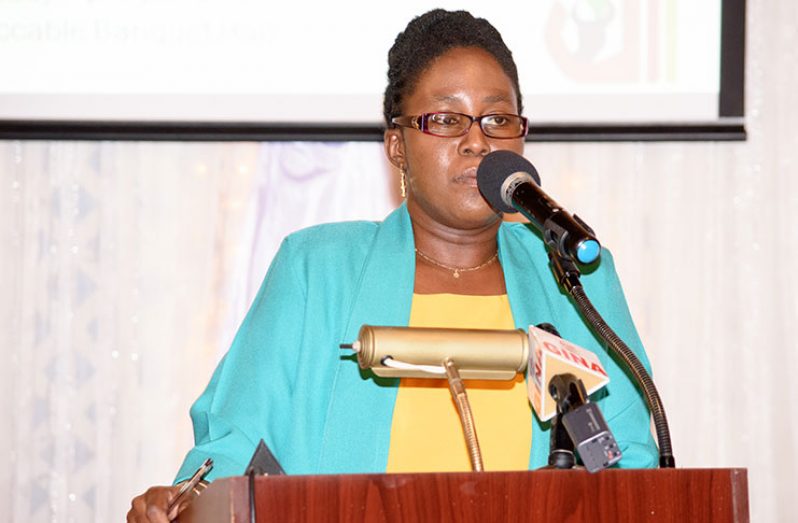— in implementation of national and international standards
EXECUTIVE Director of the Guyana National Bureau of Standards (GNBS) Candelle Walcott-

Bostwick,has said that some local manufacturers have fallen short in the implementation of national and international standards needed to be competitive on the global market.
Walcott-Bostwick was at the time speaking during the first National Codex Committee (NCC) Stakeholders’ Forum held recently at De Impeccable Banquet Hall, Brickdam, Georgetown, under the theme: “Food and Nutrition Security: Food Safety, the Key.”
It was organised by the GNBS in collaboration with the CODEX Alimentarius International Food Standards, the World Health Organisation (WHO), the Pesticide and Toxic Chemical Control Board and the Food and Agriculture Organisation (FAO).
The Codex Alimentarius (Latin for “Food Code”) is a collection of internationally recognised standards, codes of practice, guidelines, and other recommendations relating to foods, food production, and food safety.
In the presence of Chile’s Ambassador to Guyana, Claudio Rojas Rachel; Esso Exploration and Production Company Environmental and Regulatory Advisor, Dan Steurer, and other key stakeholders, including representatives from the FAO and WHO Pesticide and Toxic Chemical Board, Walcott-Bostwick said implementation of standards outlined by organisations such as Codex will enable local producers and manufacturers better access to regional and international markets.
“Our local manufacturers have to recognise that if we do not implement the standards which provide confidence and in the case of food safety, if we don’t implement standards that would indicate that a particular food or product is safe, our products would not be able to access regional and global markets,” she explained.
TREMENDOUS EFFORTS
At the level of GNBS, the directors said tremendous efforts are being made to ensure that the country’s local industries are up to date with international standards governing a wide range of industries.
Additionally, she said the GNBS will be working with the ministries of health and agriculture to bring about greater awareness on the standards that currently exist within the local arena and the need for implementation.
“If we want to ensure that our products are competitive, now is the time for us to implement the standards that are available.”
The NCC which was resuscitated on March 5, 2014, is a body that is designed to advise the Government of Guyana on the implications of various food standards and food-safety issues, which have risen in the overall context by the work undertaken by the CODEX Alimentarius Commission.
The CODEX Alimentarius international food standards, guidelines and codes of practice contribute to the safety, quality and fairness of this international food trade.
Consumers can trust the safety and quality of the food products they buy, and importers can trust that the food they order will be in accordance with their specifications.
NCC Vice-Chairperson, Maxine Parris-Aaron, further explained that the forum was held to build awareness on Code Alimentarius and its benefits to Guyana’s food safety structure and the constant modification of Global Food Safety.
“The National Codex Committee… felt that this forum was necessary and timely, given the impending passage of the Food Control Bill, the dynamics of food safety globally and the urgent need for our country to improve and increase its participation in activities and work of the Codex Alimentarius Commission,” she told those present.
COORDINATED APPROACH
Meanwhile, Ambassador Rojas Rachel, in delivering brief remarks, said the agro food sector in Latin America and the Caribbean Region faces a number of challenges – challenges which must be addressed through a coordinated approach.
“Among those challenges, climate change is a growing concern. We must adapt our productive cycle and system to it. Extreme weather conditions and their impact in agriculture are more common every day. Recent studies have singled the Caribbean Region as one of the most vulnerable areas to be affected by climate change,” he explained, adding that these natural disasters can overall affect the production of food derived from agriculture, and other related activities such as fishing and tourism in rural areas.
He said too that new trends that favour protectionism, and new forms related to different types of regulatory requirements could threaten the ability to gain access to markets that have traditionally provided better opportunities for producers.
“All of the above require better coordination of our countries regionally and globally, by improving our trade and economic cooperation and integration,” he maintained.
Ambassador Rojas Rachel said at the core of these issues is the need to improve sanitary and phytosanitary standards, as well as the Region’s food-safety systems. They are crucial requirements to access the international and local markets and to guarantee consumers the quality of what they are buying, he emphasised.
Presentations were also given by Andrea Mendonca, technical officer, GNBS; Mark Pierre, agricultural health and food safety specialist, Ministry of Agriculture; Suresh Amichand, senior inspector, Pesticide and Toxic Chemical Control Board; Grace Parris, lecturer and manager, Agro- processing Facility, Guyana School of Agriculture; and Anthony Ross, quality assurance manager, Sterling Products Limited, among others.




.png)









